Student Blog
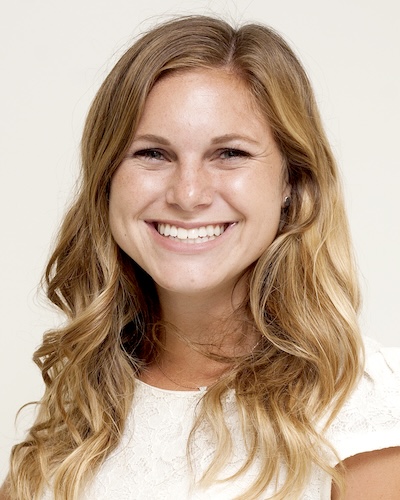
Benefits of Cohorts ⟩
November 28, 2017, by Ali
This is our last week of classes with our cohorts, and it has me reflecting on what a special experience it is to study at USC in the Chan Division of Occupational Science and Occupational Therapy. As some of the other blogs have talked about, our entire class of Entry-Level Professional Master of Arts degree students is divided into three cohorts. So our 130-140 person class is broken up into 40-45 person sections. Across the span of three semesters, each cohort takes one of the three immersions focused on Adult Rehabilitation, Mental Health, or Pediatrics. The cohorts will rotate through each of these immersion courses over the three semesters.
Although the immersion coursework is with your cohort, the other thread courses such as Therapeutic Use of Self and Clinical Reasoning are with these same individuals in your cohort. The nature of these courses lends cohorts to be very close knit. We explore different practice areas together as well as develop our own sense of self as therapists. We develop our understanding of occupational therapy and build our clinical reasoning together. These semesters are formative in building our professional identities, so each semester we become more and more bonded as classmates and future therapists.
Reflecting on this last week of a rigorous semester, our last lab in Adult Rehabilitation focused on creating a meal together as a class utilizing adaptive equipment in the functional kitchen where our lab class takes place. There was no better way to end three semesters of coursework with my classmates than creating a meal together. As someone who is shy to speak up in a group of 130 people, with my cohort of 45 students who I got to know on a personal level I always felt comfortable asking questions or seeking out help from whomever I happen to sit next to that day. As Bryan references in his post a week ago, our cohort is constantly lifting each other up and checking in with one another.
Here are some pictures of Cohort B in Adult Rehabilitation during our last lab!
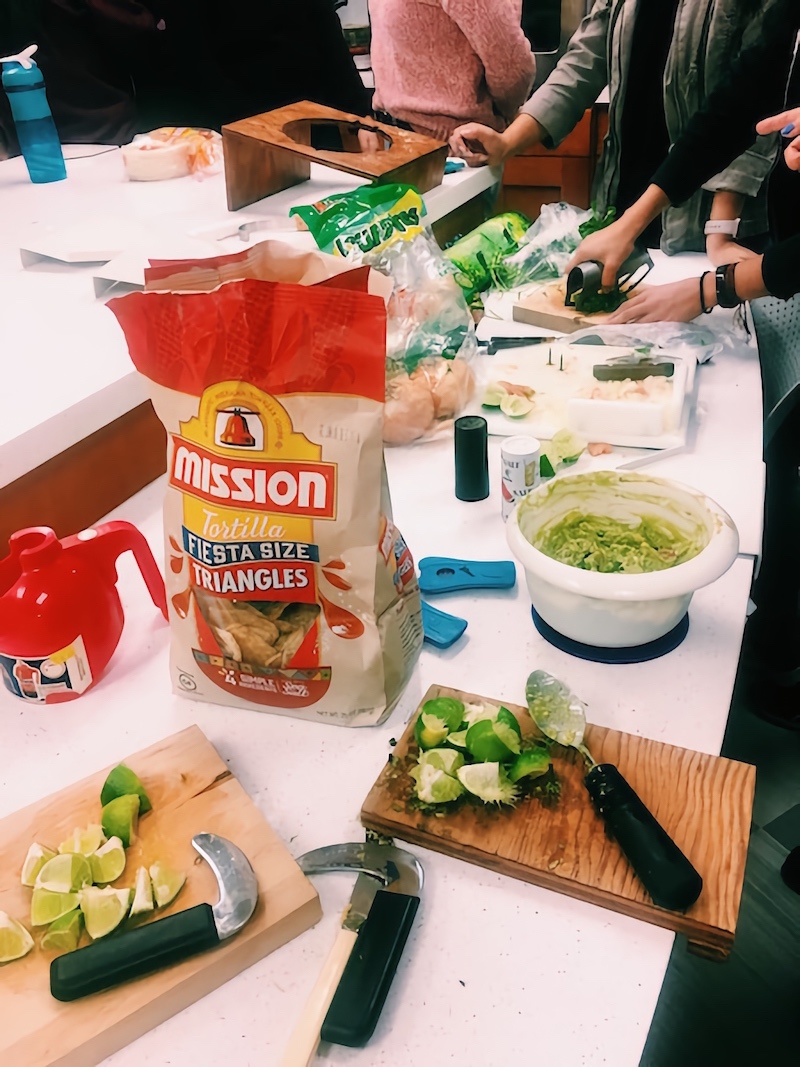
Taco Tuesday in our functional kitchen using adaptive equipment!
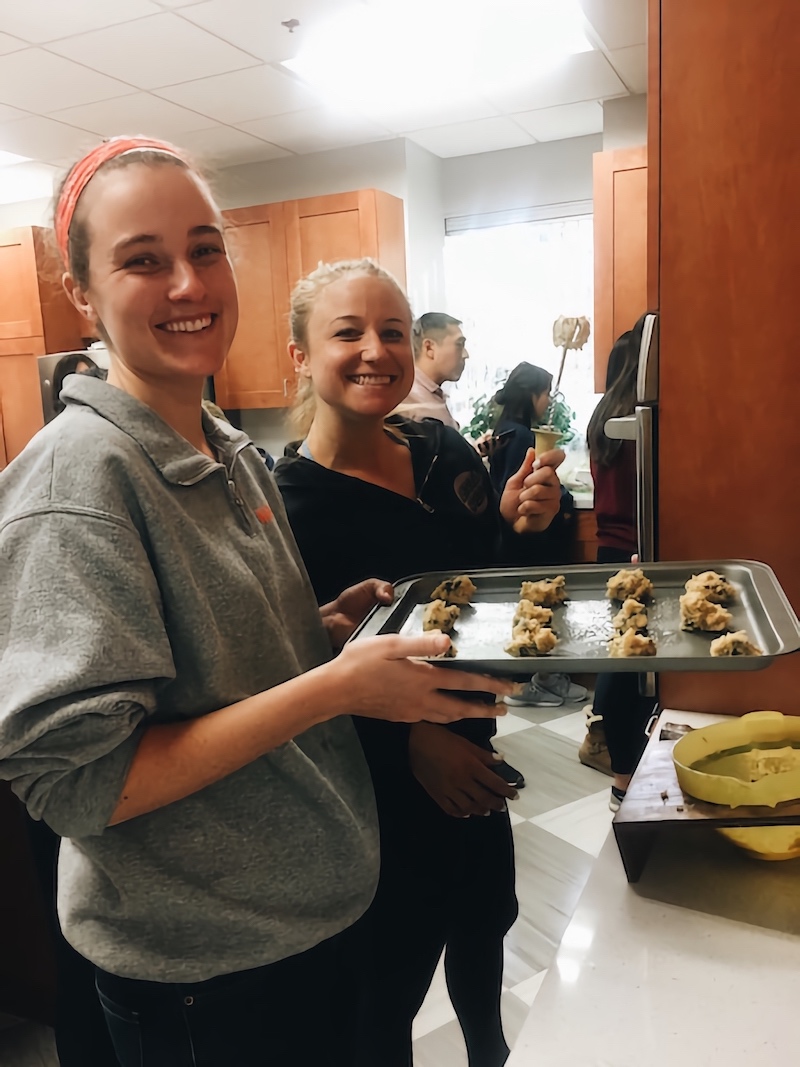
Cookie Creations with Cohort B!
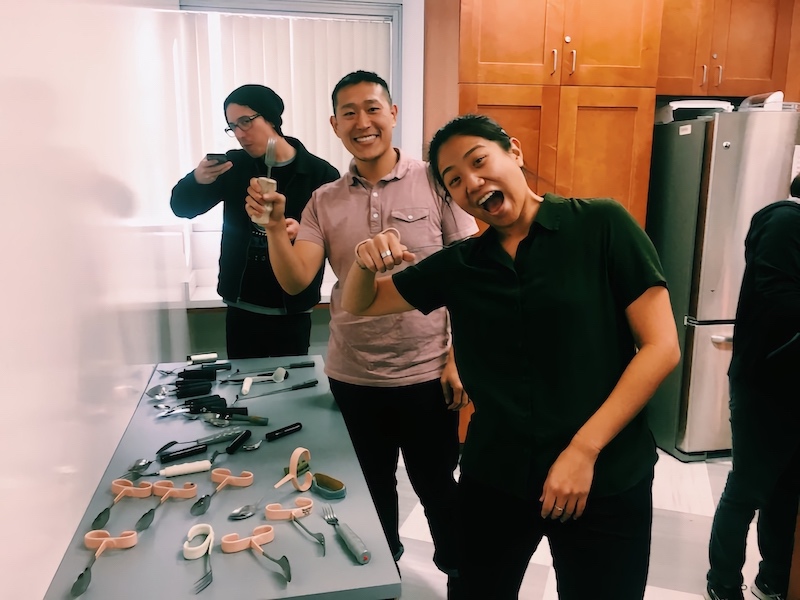
Fellow Student Ambassadors in Cohort B
⋯
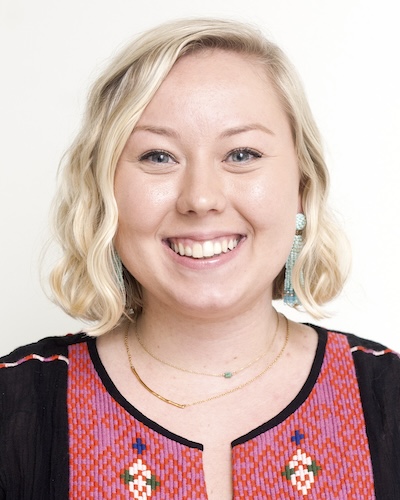
The 4 Thanksgiving Fs: Food, Friends, Football, and Family ⟩
November 21, 2017, by Caroline
It might not be Thanksgiving quite yet, but the Thanksgiving spirit is definitely in the air (can you tell from Bryan and Ali’s posts?). Well, you lucky readers, here comes one more Thanksgiving appreciation blog!
This past weekend was filled with three of my favorite Thanksgiving occupations: food, friends, and football.
On Friday night, I journeyed out to a classmate’s house a couple hours outside LA for an early Thanksgiving with friends. It was truly one of the highlights of my semester. Let me tell you — the air was so fresh and I could see stars in the sky! I’ve definitely gotten used to big city life (and all of its perks) but it was a breath of (literal) fresh air to get out of the city for a night! We had a huge buffet of food, a fire pit, and so many laughs. It was a great chance to get together with friends who aren’t in my cohort and catch up!
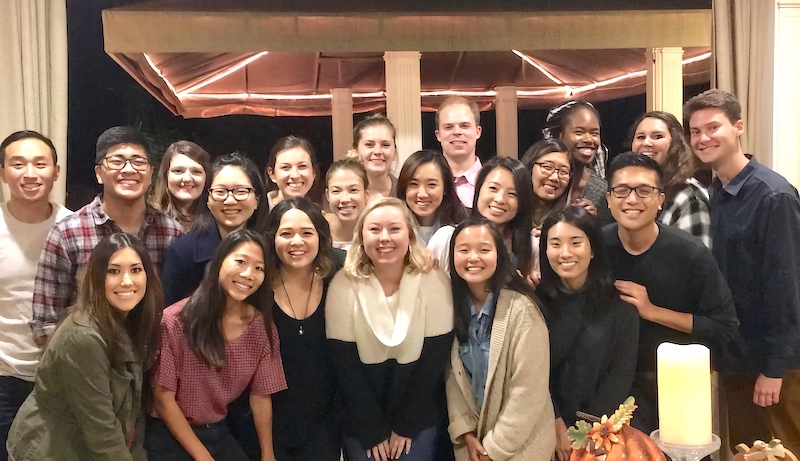
A food- and friendship-filled early Thanksgiving celebration with wonderful friends from the program.
On Saturday, I went to the USC vs. UCLA football game. Our OT programs were actually being recognized at the game, so a big group of us got to go onto the field for a photo op before warm ups. Definitely a different view than the one I’m used to from the student section! We were also featured on the screen during the game — how cool right?! After the photo op, I went to the OT and Physical Therapy tailgate (gotta love the interprofessional mixing!) before heading to the game (which we won!!). Go Trojans!
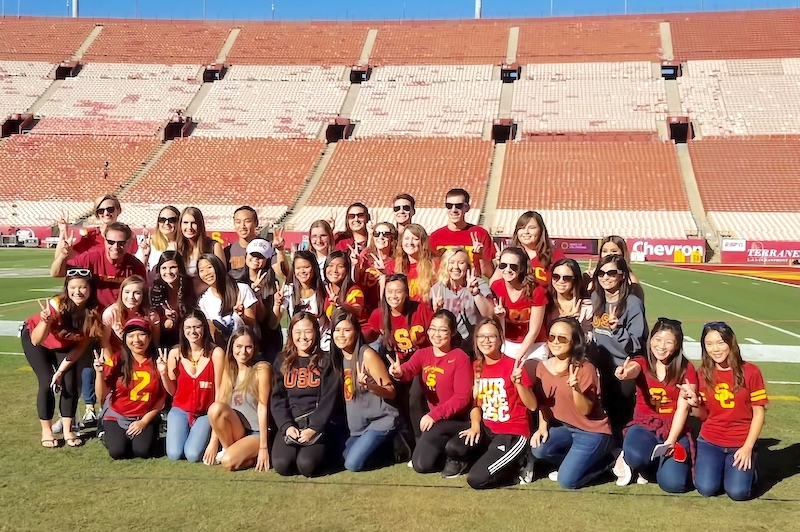
Here’s the picture of our whole group out on the field. Check out those V’s for victory!
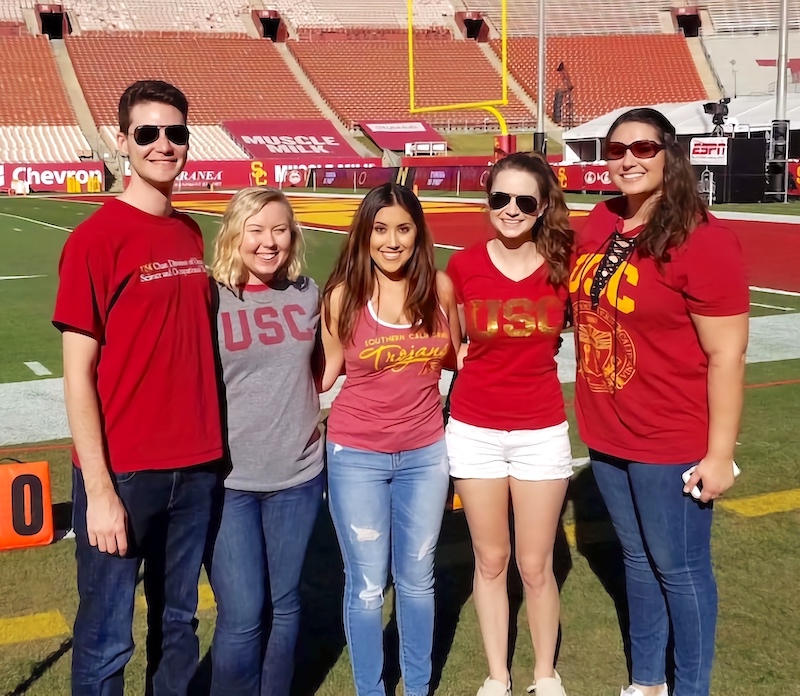
Another photo from our experience on the field!
Food, Friends, and Football — it was definitely a fun weekend. “And the last F?” my detail-oriented readers might ask. Family time is coming soon! In fact, I’m writing this from none other than LAX airport waiting to board my flight back home to North Carolina. As I was packing my sweaters and winter clothes and gearing up for colder weather back on the East Coast, I jokingly texted my mom that I’d rather stay in LA for 90 degree Thanksgiving weather. She knew exactly what would convince me to come home — pictures of my dogs that are (almost) as excited for me to come home as my human family. Guess I could add one more F to my list of Thanksgiving words: fluffy pups. Photos of the pups included to increase the cuteness factor of this blog post:
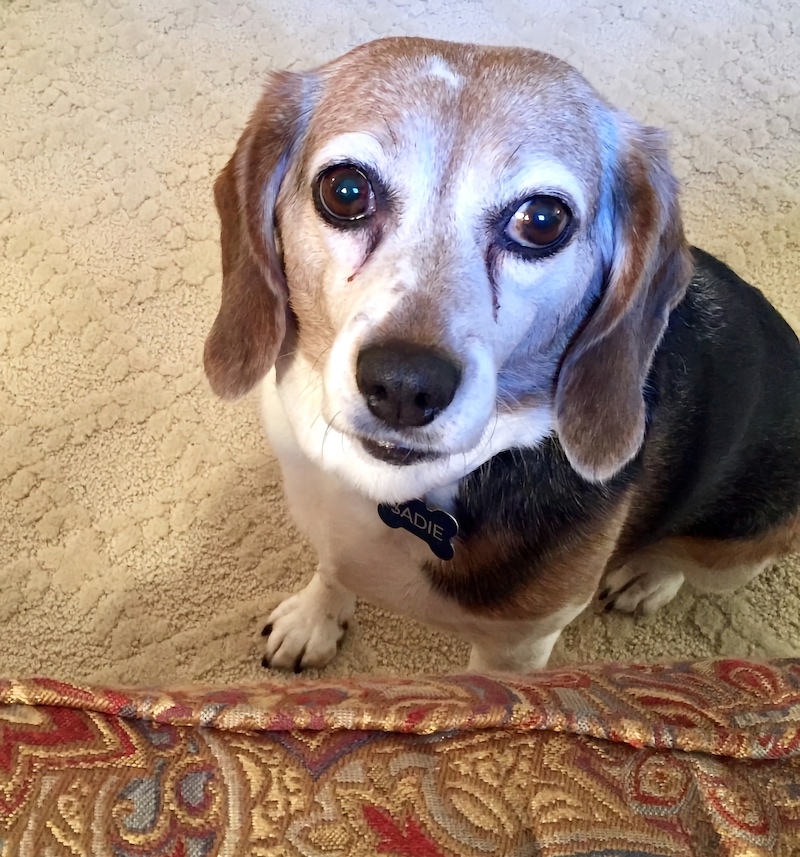
Meet Sadie, who is very excited to lounge with me on the couch. Look at those needy eyes!
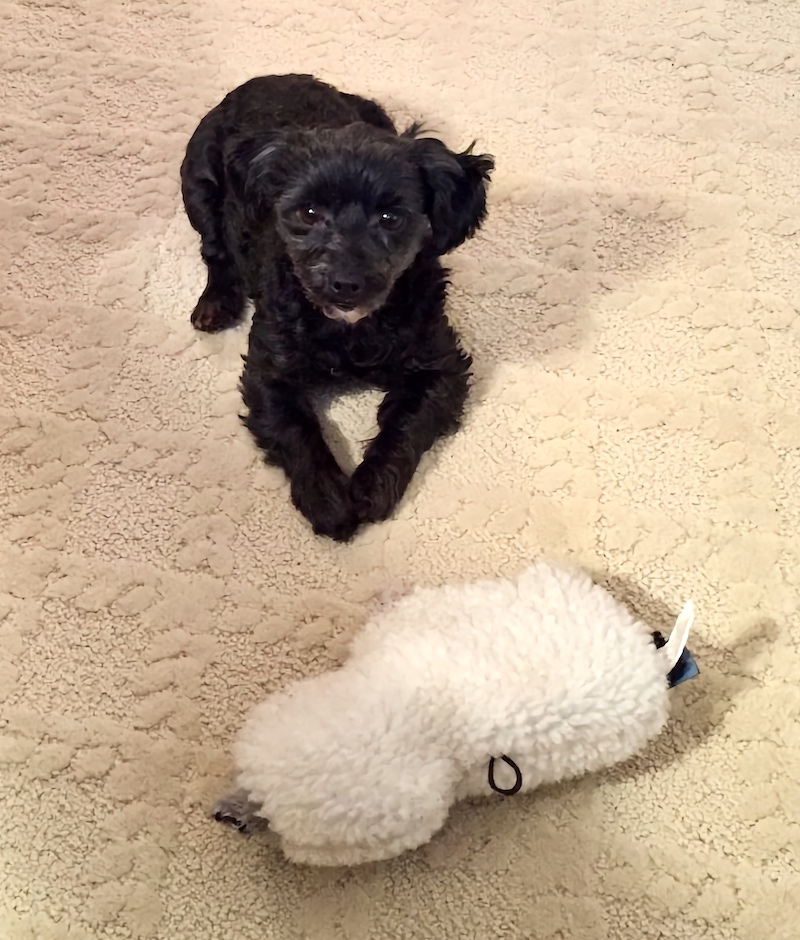
Meet Gracie, who is excited to have another human at home to play with her!
Looking forward to a few days off from school before heading back for the last week of classes and final exams. Happy Thanksgiving to all!
⋯
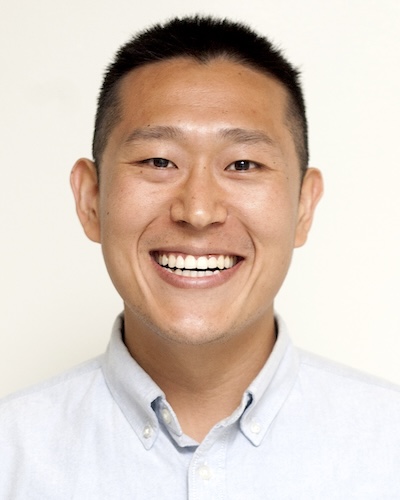
My Favorite Holiday ⟩
November 21, 2017, by Bryan
More than the food, football, and even times with family, I love Thanksgiving because it forces me for at least one day to stop complaining (“OMG Adult Rehabilitation is so tiring”) and try to focus on expressing gratitude. So, here are a few things I am thankful for in relation to OT and my time here at USC:
- Cohort B. Wow, it is an understatement to say that all my classmates at OT school, especially my cohort, are some of the best people I have had the opportunity to work with. I am especially grateful for cohort B because with the grind of the semester, they definitely see the worst of me. Whenever I am tired or grumpy or just over having to write short term and long term goals for ADLs, my cohort members consistently great me with a smile or ask me how I am doing. It has been a very unique and uplifting experience to feel so cared for throughout the rigors of balancing graduate school and life.
- Eric Cohen Student Health Center Free Coffee. I was honestly thinking about making this #1. Free coffee from Eric Cohen Student Health Center is the lifeblood of this program for me.
- Fieldwork educators and experiences. I have been really lucky with some great fieldwork placements throughout the program (inpatient rehabilitation facility for adult rehabilitation, pediatrics acute inpatient rehabilitation, and clubhouse setting for adults with developmental disabilities). At all three sites I had great clinical instructors/supervisors who challenged me as a clinician and helped me grow in applying what I learned in class into practice. I grew in the skills of building interpersonal relationships and establishing rapport with clients and their families. I learned how to study and come prepared to fieldwork the next day only to have all my plans thrown out the window and need to adapt to an entirely new situation and circumstances.
- Student Ambassadors. Last but not least, it has been a great privilege to be part of the Student Ambassador team this year. I honestly thought the position would be a really tough time commitment throughout the semester, but I am surprised how fun it has been giving tours and information sessions as well as presentations to prospective students. I realized how much I enjoy getting to know other people and seeing their own discovery of OT grow. It has also been so fun working with my fellow Ambassadors! It is difficult to see friends in different cohorts, so I am grateful we get to work together.
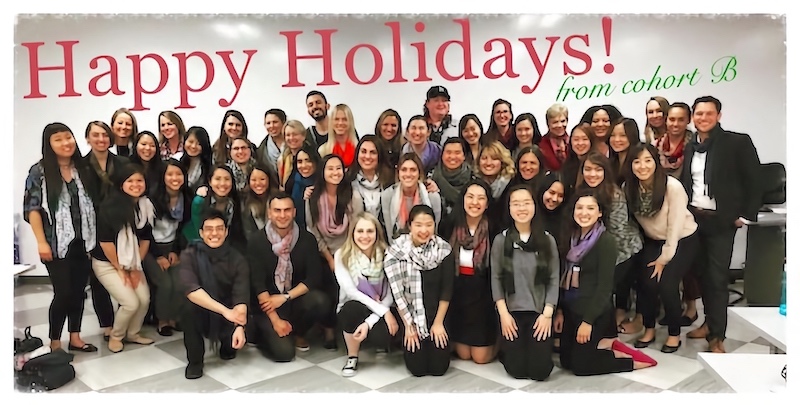
Cohort B Class of 2018
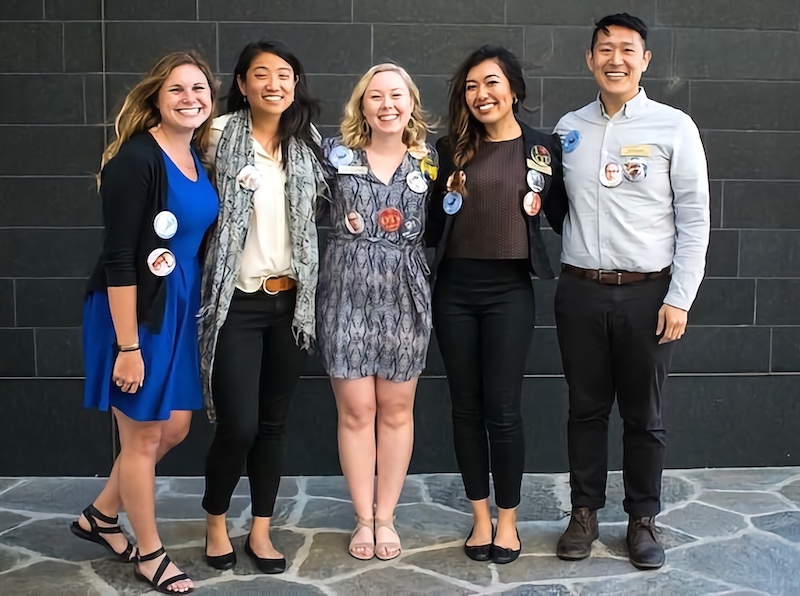
Student Ambassadors 2018
Happy Thanksgiving everyone!
⋯
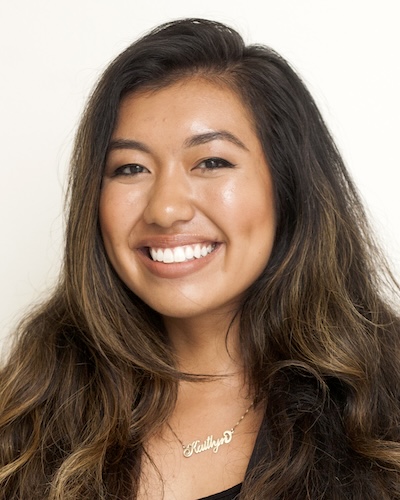
What it Means to be an OTAC Student Delegate ⟩
November 21, 2017, by Kaitlyn
I have been asked what I do as an Occupational Therapy Association of California (OTAC) Student Delegate quite frequently and I don’t blame people for asking. I will admit that it is a bit elusive, and that is because it is a very multi-faceted role with a lot of “behind the scenes” work.
Becoming an OTAC Student Delegate through USC’s OT program begins with an Executive Board Occupational Therapy and Science Council (OTSC) election process. After elected, there is an application and letter of recommendation process as well. Once these steps are complete, you can begin your role as an OTAC Student Delegate!
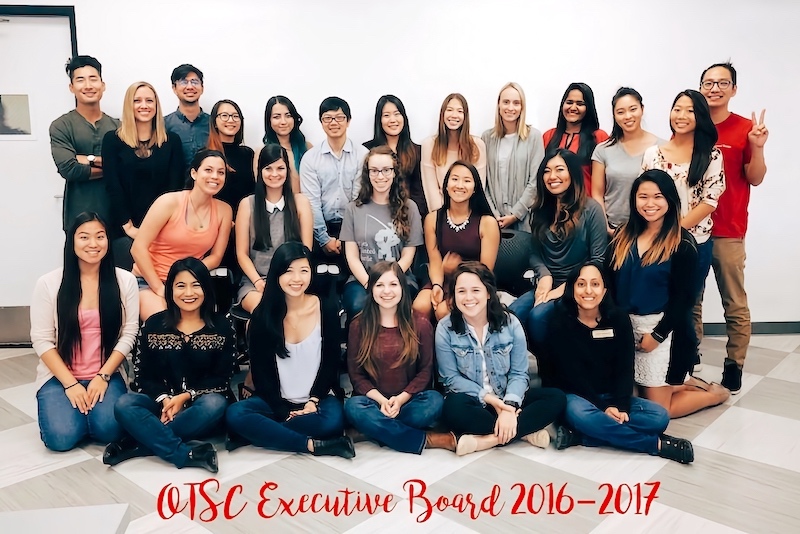
USC OTSC Executive Board 2016-2017
There are many derivatives that come out of the OTAC Student Delegate role. I function as an integral member of the OTAC Student Leadership Committee and a liaison between our program and OTAC. I also help plan and organize events in collaboration with OTAC and participate in conference calls and meetings with our committee co-chairs and other students from different OT programs in California.
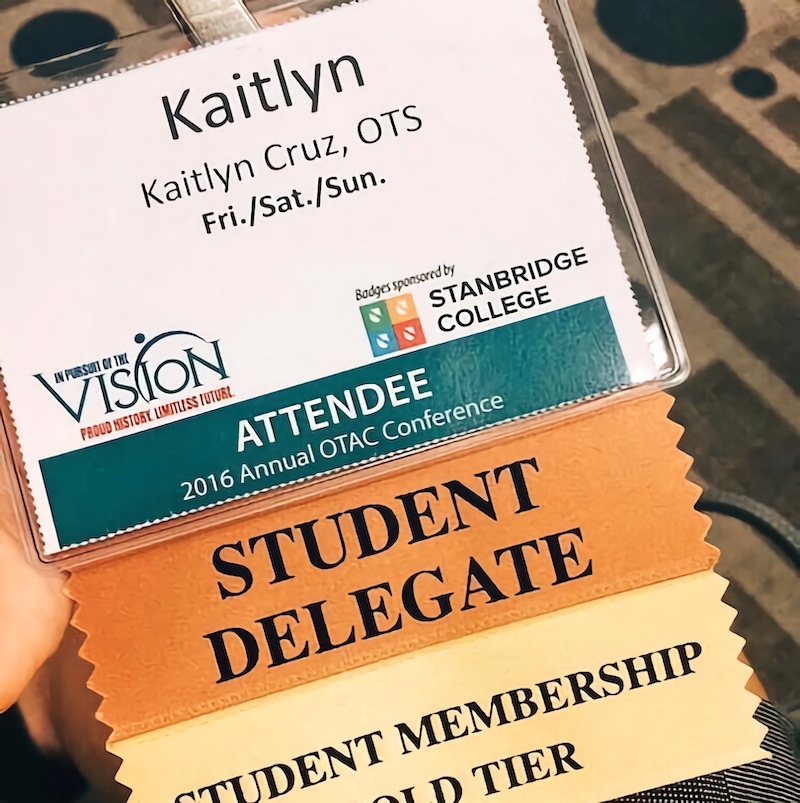
Out of all the things that I am expected (and love) to do, being able to help plan and organize events is my favorite. For example, one of the events we have is called ‘Afternoon Tea with a Scholar.’ Last year’s 15th Annual Afternoon Tea with a Scholar featured Ann McDonald, MA, PhD, OTR/L (and USC alum!), who spoke about the dynamic role of OT in support of families due to the difficult task of meeting the needs of a family member who has a physical, emotional, or neurodevelopmental challenge. At this event specifically, I served as a student representative, introduced myself to all OTAC members and supporting guests, and helped with setup and cleanup of the entire event.
Another event that I thoroughly enjoy is our annual Legislative Reception. The Legislative Reception provides a forum for OT practitioners to interact with legislators and their staff about health care issues that OTs are facing. This event provides an opportunity for our profession to dialogue about the changes we want to see, advocate for the profession, and discuss key issues in healthcare. This event required a lot of preparation beforehand with weekly committee conference calls and also being proactive about communicating with legislators around the Southern California area.
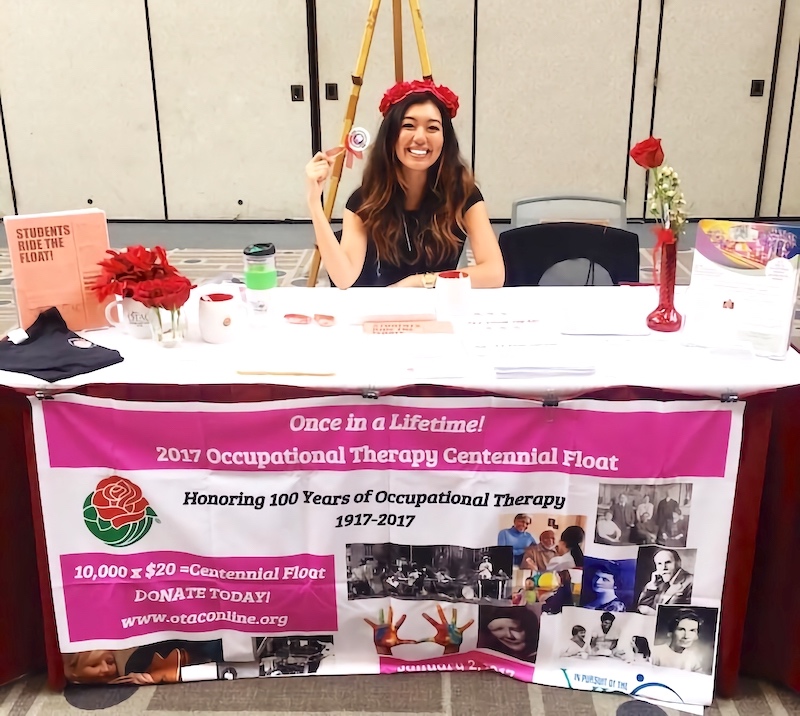
Working at the Rose Parade Float Booth at OTAC Conference 2016
Our biggest events, of course, are the OTAC Annual Conference (which was in Pasadena last year, Sacramento this year) and OTAC Spring Symposium (which was in San Diego in the spring). At these events, I have helped run the student track by organizing and facilitating the Q&A panel, facilitating the social mixer, introducing speakers, serving as a room monitor, and so much more. At last year’s OTAC Annual Conference, I also worked the OTAC Rose Parade Float Booth to help fundraise money for our float that was featured in the 2017 Rose Parade. In that weekend alone, we raised more than $6,000!
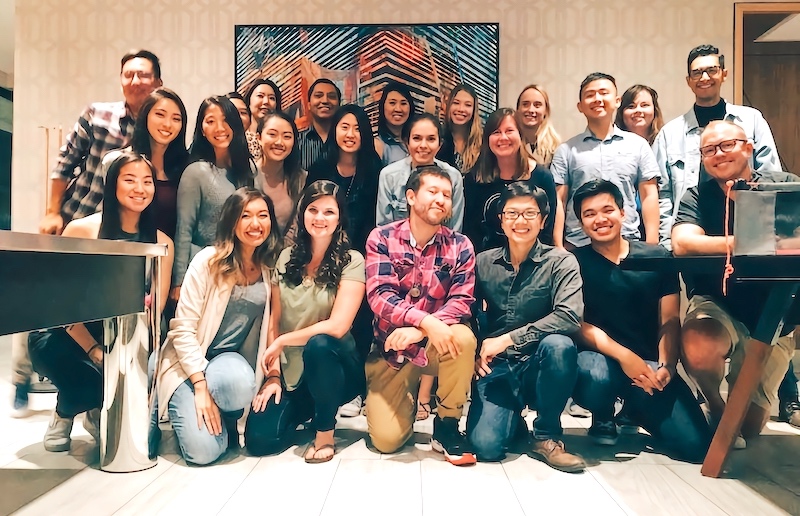
Our new USC OTSC Executive Board 2017-2018!
Overall, I’ve grown so much professionally and personally through this role.The biggest lesson I’ve learned in this specific journey is to always take a chance (when appropriate, obviously) and go towards things even without knowing the outcome. I went into the initial OTSC Executive Board election with hopes, but no expectations. Because of this, I have found my time being an OTAC Student Delegate so much more rewarding and have been so much more grateful for the opportunity.
⋯
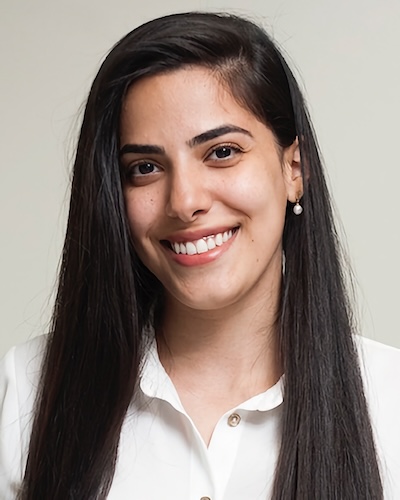
Personal Statements: What Helps? ⟩
November 21, 2017, by Linah
One of the most stressful things that comes along with applying to undergraduate and graduate programs is writing a personal statement. The rules aren’t that clear when it comes to these things, and everyone has a different perspective on what a personal statement ought to be. I have been working on my own PhD personal statement for the past few weeks and it has been a challenge. Mainly because at this point of the semester my energy levels have been dwindled to a speck, and we still have about 3 more weeks to push through.
Since this is very important to me, I find myself being highly critical of everything I produce. This does not help at all with my time constraints, because I keep throwing out every rough draft I come up with. A feeling that might be familiar to many and counter-productive to all. In an effort to gain better perspective, I ventured on to ask fellow friends and faculty about helpful elements to incorporate in a personal statement. Here are some of the advice I received:
Find A Way To Highlight A Unique Point
For starters, many think it is helpful to separate myself from the rest by highlighting something unique about myself or background or past experience. It helps to try to see things from the admission committee’s perspective, being an international student offers a lot to draw from. A friend recommended to use past work experiences to showcase my own abilities and skills, how well I performed something or highlight skills I mastered during that time. It will not be enough to just state where I worked before, because that information is attainable through the CV attached with the personal statement. No need to be redundant. It would make more sense to talk about with whom I worked and what were my responsibilities during that time, and then mention how that particular experience has shaped me into the occupational therapist I am today.
Describe How The Program Will Help You Achieve Your Goals
A colleague suggested that by talking about my own experiences, I can transition into talking about what the program itself offers to further build on it. This way I am able to specify which courses I am interested in and maybe even professors I am eager to work with. It would also be helpful to write about my own plans for myself in the future and perhaps explain how the program would help me achieve them. This would be a good opportunity to explain why I chose this specific program, because that is an important part of any personal statement.
Make It Personal, But Make Sure To Address The Prompt
I reached out to some of the faculty for advice, and the main piece of advice I got was to view the personal statement as a way to tell the admissions committee who I am. In other words, it is important to demonstrate my personality. To prevent myself from making the statement too personal, I try to always reel back to the prompt provided. This way, I can stay on topic. It is also another point that was mentioned by one of the faculty members here in USC; to make sure I address the prompt.
Have It Reviewed By Friends & Family
In order to make sure I review my personal statement properly, I asked fellow friends or family members to proofread it for me. Their feedback is crucial because from there I can tell whether or not I was able to communicate my thoughts well. It is also an effective way to weed out any spelling or grammatical errors, which can really dampen a personal statement if not attended to.
Lastly, the gist of the advice I got was to make a good case for myself as to why I should be accepted. This means writing compelling arguments and making sure to back them up with evidence from my resume or recommendation letters. In other words, a personal statement is what ties the entire application together, so better make it worth it.
⋯





